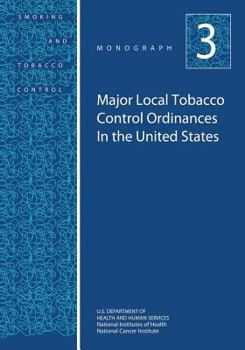Major Local Tobacco Control Ordinances in the United States: Smoking and Tobacco Control Monograph No. 3
The adoption of local ordinances regulating the use or sale of tobacco represents an extraordinary social trend in the United States. Although such laws were virtually unheard of just a decade ago, hundreds of cities and counties across this country have taken aggressive action to control smoking in public settings as well as making it more difficult for minors to obtain tobacco. Major Local Tobacco Control Ordinances in the United States provides clear documentation of the extent to which local com- munities are enacting legislation to restrict or severely curtail tobacco use. The monograph also represents a social barometer regarding the seriousness with which communities view the smoking problem and the range of remedial actions taken to reduce tobacco use through socially responsible public policies. These ordinances are not based on social whim, however, but are based on decades of scientific research, which has increasingly documented the health consequences of tobacco for users and non-users alike. Since the early 1960's, medical science has left no doubt about the deadly nature of tobacco use, especially the practice of cigarette smoking. The scientific data base establishing a causal connection between smoking and increased death rates from various cancers, cardiovascular diseases, chronic obstructive lung diseases, fetal distress, and other chronic and debilitating conditions is truly staggering. Between 1960 and 1990, more than 60,000 scientific citations appeared in the worldwide literature linking cigarettes and other forms of tobacco use to these adverse health outcomes. Smoking is a health hazard in its own right, but smoking potentiates the risks of several environmental and occupational carcinogens. More than 400,000 premature deaths annually occur in the United States directly attributed to the effects of cigarette smoking. Of course, we should recall that even smokeless tobacco is a health hazard. Such high levels of death and disability affect us all, however, whether we smoke or not. In a comprehensive study conducted by the Congress' Office of Technology Assessment in 1985, it was estimated that cigarette smoking alone cost this Nation upwards of $95 billion annually. Given the spiraling increase in costs for both acute and long-term health care over just the last few years, such costs would be substantially greater in 1993 dollars. As a Nation, we simply cannot afford to pay for the health care costs associated with smoking. Major Local Tobacco Control Ordinances in the United States should also provide a tangible boost for local tobacco control policy development. It contains a comprehensive review of local and State tobacco control legislation, trends in tobacco control ordinances, and model laws for reducing both nonsmokers' exposure to ETS and youth access to tobacco products. It is, in short, a call to action to all who wish to improve the health of our Nation through reasonable and prudent public health policies that reduce tobacco addiction among our young and protect nonsmokers from the documented hazards of environmental tobacco smoke. Nevertheless, true prevention of smoking-related illnesses must depend on individual responsibility and action. Each of us as individuals must do our part.
Format:Paperback
Language:English
ISBN:1499635923
ISBN13:9781499635928
Release Date:May 2014
Publisher:Createspace Independent Publishing Platform
Length:150 Pages
Weight:0.60 lbs.
Dimensions:0.3" x 7.0" x 10.0"
Customer Reviews
0 rating





